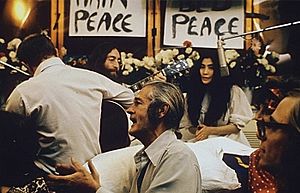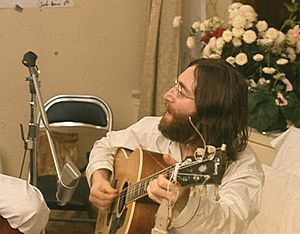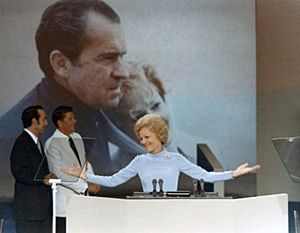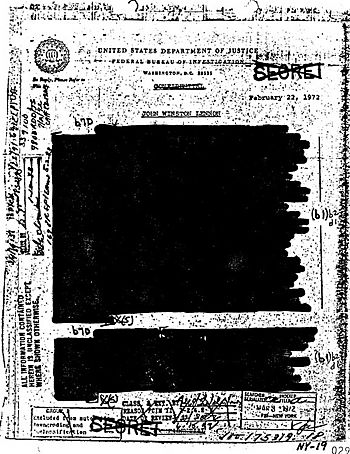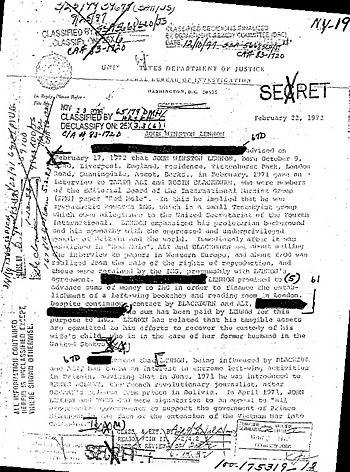Jon Wiener facts for kids
Quick facts for kids
Jon Wiener
|
|
|---|---|
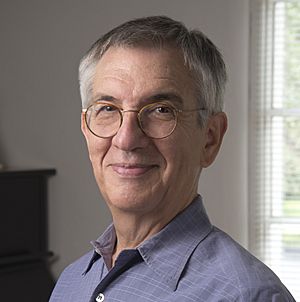 |
|
| Born | May 16, 1944 Saint Paul, Minnesota, U.S.
|
| Alma mater | Princeton University (BA) Harvard University (PhD) |
| Occupation | Historian, Political writer, Author |
| Years active | 38+ |
| Employer | University of California, Irvine |
| Spouse(s) | Judy Fiskin |
Jon Wiener, born on May 16, 1944, is an American historian and journalist. He lives in Los Angeles, California. He is known for his work as a history professor and for fighting to release government files about John Lennon. Wiener also co-wrote the book Set the Night on Fire: L.A. in the Sixties, which became a bestseller. He hosts a weekly podcast called Start Making Sense and writes for The Nation magazine.
Set the Night on Fire (published in 2020) tells the story of important movements in Los Angeles. It covers civil rights, Black power, and Chicano movements. It also includes the anti-war movement, gay liberation, and women's liberation. The book describes battles between young people and the police in places like Sunset Strip and Venice Beach. It also looks at the counterculture, like the Ash Grove folk music club and KPFK radio.
Contents
Early Life and Education
Wiener was born in Saint Paul, Minnesota. His parents were Gladys and Dr. Daniel Wiener. He went to Central High School. Later, he attended Princeton University. There, he started a group called Students for a Democratic Society. This group protested the Vietnam War.
He earned his bachelor's degree from Princeton in 1966. He then received his PhD from Harvard. While at Harvard, he also wrote for an underground newspaper called The Old Mole.
Jon Wiener's Career
Teaching History
At the University of California, Irvine, Jon Wiener taught history classes. These classes focused on American politics and the Cold War. His academic writings have appeared in several important history journals. He also took his students on trips to the Nixon Library.
Journalism and Writing
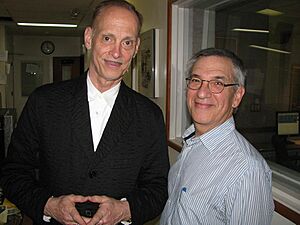
Since 1984, Wiener has been a contributing editor for The Nation magazine. He writes about many different topics, including college issues and politics in Southern California. His articles have also been published in The Guardian, The New York Times Magazine, and the Los Angeles Times. He hosts a weekly podcast and a radio show in Los Angeles.
In his journalism, Wiener has interviewed many interesting people. He spoke with Chinese artist Ai Wei Wei about the global refugee crisis. He also talked with voting rights organizer Stacey Abrams. Wiener has written about historical events, like the 50th anniversary of the My Lai Massacre. He is well-known for his long fight to get the FBI to release files on John Lennon. He also helped get FBI documents released about comedian Groucho Marx.
The Fight for John Lennon's FBI Files
Jon Wiener spent 25 years in a legal battle to get the FBI to release its files on John Lennon. This fight showed how the government watched Lennon. It also revealed the disagreements between the government and the former Beatle.
Why the FBI Watched Lennon
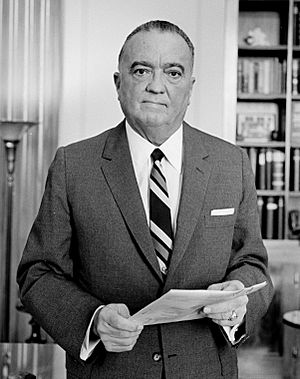
In the late 1960s, many young Americans were against the Vietnam War. John Lennon became a strong voice against the war. This made then-President Richard Nixon worried about his chances of being reelected in 1972. Nixon likely asked the FBI to start watching Lennon. This surveillance lasted about 11 months.
The Attempt to Deport Lennon
In 1972, the Immigration and Naturalization Service tried to deport Lennon. This was probably at the request of President Nixon. The main reason was that Lennon was talking to anti-war leaders. They were planning a tour that would combine rock music with anti-war organizing. This tour aimed to encourage young people to vote.
Many friends, including folk singer Bob Dylan, wrote letters to support Lennon. They wanted him to be allowed to stay in the U.S. After Nixon was reelected in November 1972, the FBI closed its investigation. They noted that Lennon had become "inactive in Revolutionary Activities." Wiener believes the FBI succeeded in stopping Lennon's opposition to Nixon's reelection. John Lennon was murdered in December 1980.
Wiener vs. the FBI in Court
In 1981, Jon Wiener learned about the FBI's files on Lennon. He asked for these files to be released using the Freedom of Information Act. The FBI refused to release most of the files. They claimed the documents contained "national security" information. The pages they did release were heavily blacked out.
In 1983, Wiener sued the FBI with help from the ACLU. The FBI released some documents but held back others. They said releasing them could lead to "military retaliation against the United States."
Wiener wrote about his struggles in his 1984 book Come Together. A big moment came in 1991. The 9th Circuit appeals court ruled in Wiener's favor. They said the FBI had not given good enough reasons to keep the information secret. The Justice Department appealed this decision, but the Supreme Court refused to hear the appeal.
In 1997, a settlement was reached with the FBI. Most documents were released to Wiener. The government also paid $204,000 in court costs. Ten documents were still held back for "national security" reasons. Finally, in 2006, the last eight or ten documents were released. Wiener said these pages showed Lennon had contacts with anti-war groups in London. However, they did not show that officials saw Lennon as a serious threat.
Wiener was surprised that so much information had been kept secret. He once mentioned a report from an undercover agent. This report described a parrot at an anti-war meeting that would shout "Right on!" when discussions got heated. Wiener wondered why such information was classified as "confidential."
Sharing the Story
Wiener wrote about his legal battles in his book, Gimme Some Truth: The John Lennon FBI Files, published in 2000. The book includes copies of 100 key documents from Lennon's file. These documents include reports from secret informants and memos to the White House.
Wiener's work was also the basis for the 2006 documentary The U.S. vs. John Lennon. Wiener was a historical consultant for the film and appeared in it. He also appeared in the 2010 documentary LENNONYC.
Books by Jon Wiener
Jon Wiener has written seven books. Besides Set the Night on Fire: L.A. in the Sixties, he wrote Historians in Trouble: Plagiarism, Fraud and Power in the Ivory Tower. This book looked at academic scandals.
He also edited Conspiracy in the Streets: The Extraordinary Trial of the Chicago Seven. This book included parts of the 1968 Chicago Conspiracy trial. In that trial, anti-war activists faced charges after protests at the Democratic National Convention.
What Critics Say
Critics have had different reactions to Wiener's books. Kirkus Reviews called Set the Night on Fire "a richly detailed portrait of a city that seethed with rebellious energy." The Los Angeles Times described it as "authoritative and impressive." Publishers Weekly called it an "indispensable portrait of an unexplored chapter in history."
For his earlier books, The New York Times Book Review said Come Together: John Lennon in His Time was one of the few books that didn't try to make Lennon seem like a god or dig up dirt on him. His book Gimme Some Truth received good reviews from The Washington Post and the Christian Science Monitor.
See also
- John Lennon
- Give Peace a Chance
- Federal Bureau of Investigation
 | Kyle Baker |
 | Joseph Yoakum |
 | Laura Wheeler Waring |
 | Henry Ossawa Tanner |


